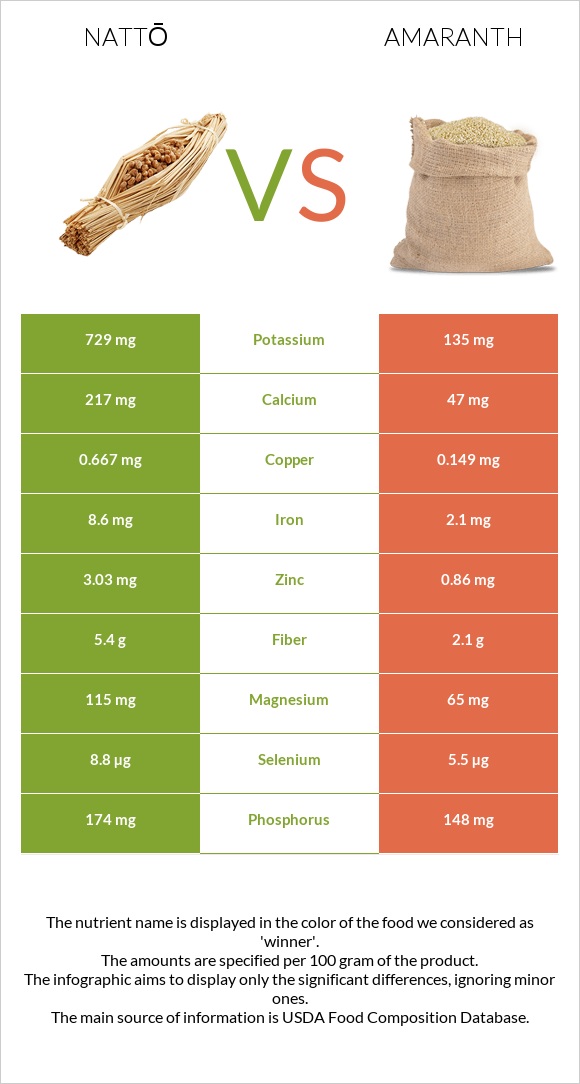Nattō vs. Amaranth — In-Depth Nutrition Comparison
Compare
A recap on the differences between nattō and amaranth
- Amaranth has less iron, copper, manganese, zinc, potassium, calcium, fiber, vitamin B2, vitamin B1, and magnesium.
- Nattō covers your daily iron needs 81% more than amaranth.
- Amaranth contains 11 times less vitamin B1 than nattō. Nattō contains 0.16mg of vitamin B1, while amaranth contains 0.015mg.
- The glycemic index of amaranth is higher.
Food varieties used in this article are Natto and Amaranth grain, cooked.
Infographic

Infographic link
Mineral Comparison
Mineral comparison score is based on the number of minerals by which one or the other food is richer. The "coverage" charts below show how much of the daily needs can be covered by 300 grams of the food.
| Contains more MagnesiumMagnesium | +76.9% |
| Contains more CalciumCalcium | +361.7% |
| Contains more PotassiumPotassium | +440% |
| Contains more IronIron | +309.5% |
| Contains more CopperCopper | +347.7% |
| Contains more ZincZinc | +252.3% |
| Contains more PhosphorusPhosphorus | +17.6% |
| Contains more ManganeseManganese | +78.9% |
| Contains more SeleniumSelenium | +60% |
| Contains less SodiumSodium | -14.3% |
Vitamin Comparison
Vitamin comparison score is based on the number of vitamins by which one or the other food is richer. The "coverage" charts below show how much of the daily needs can be covered by 300 grams of the food.
| Contains more Vitamin CVitamin C | +∞% |
| Contains more Vitamin B1Vitamin B1 | +966.7% |
| Contains more Vitamin B2Vitamin B2 | +763.6% |
| Contains more Vitamin B5Vitamin B5 | +∞% |
| Contains more Vitamin B6Vitamin B6 | +15% |
| Contains more Vitamin KVitamin K | +∞% |
| Contains more Vitamin EVitamin E | +1800% |
| Contains more Vitamin B3Vitamin B3 | +∞% |
| Contains more FolateFolate | +175% |
All nutrients comparison - raw data values
| Nutrient |  |
 |
DV% diff. |
| Iron | 8.6mg | 2.1mg | 81% |
| Copper | 0.667mg | 0.149mg | 58% |
| Polyunsaturated fat | 6.21g | 41% | |
| Protein | 19.4g | 3.8g | 31% |
| Manganese | 1.528mg | 0.854mg | 29% |
| Zinc | 3.03mg | 0.86mg | 20% |
| Vitamin K | 23.1µg | 19% | |
| Calcium | 217mg | 47mg | 17% |
| Potassium | 729mg | 135mg | 17% |
| Fats | 11g | 1.58g | 14% |
| Vitamin C | 13mg | 14% | |
| Fiber | 5.4g | 2.1g | 13% |
| Vitamin B2 | 0.19mg | 0.022mg | 13% |
| Magnesium | 115mg | 65mg | 12% |
| Vitamin B1 | 0.16mg | 0.015mg | 12% |
| Choline | 57mg | 10% | |
| Starch | 16.23g | 7% | |
| Saturated fat | 1.591g | 7% | |
| Selenium | 8.8µg | 5.5µg | 6% |
| Monounsaturated fat | 2.43g | 6% | |
| Calories | 211kcal | 102kcal | 5% |
| Phosphorus | 174mg | 148mg | 4% |
| Vitamin B5 | 0.215mg | 4% | |
| Folate | 8µg | 22µg | 4% |
| Carbs | 12.68g | 18.69g | 2% |
| Vitamin E | 0.01mg | 0.19mg | 1% |
| Vitamin B3 | 0mg | 0.235mg | 1% |
| Vitamin B6 | 0.13mg | 0.113mg | 1% |
| Net carbs | 7.28g | 16.59g | N/A |
| Sugar | 4.89g | N/A | |
| Sodium | 7mg | 6mg | 0% |
| Tryptophan | 0.223mg | 0% | |
| Threonine | 0.813mg | 0% | |
| Isoleucine | 0.931mg | 0% | |
| Leucine | 1.509mg | 0% | |
| Lysine | 1.145mg | 0% | |
| Methionine | 0.208mg | 0% | |
| Phenylalanine | 0.941mg | 0% | |
| Valine | 1.018mg | 0% | |
| Histidine | 0.512mg | 0% |
Macronutrient Comparison
Macronutrient breakdown side-by-side comparison
| Contains more ProteinProtein | +410.5% |
| Contains more FatsFats | +596.2% |
| Contains more OtherOther | +146.8% |
| Contains more CarbsCarbs | +47.4% |
| Contains more WaterWater | +36.6% |




